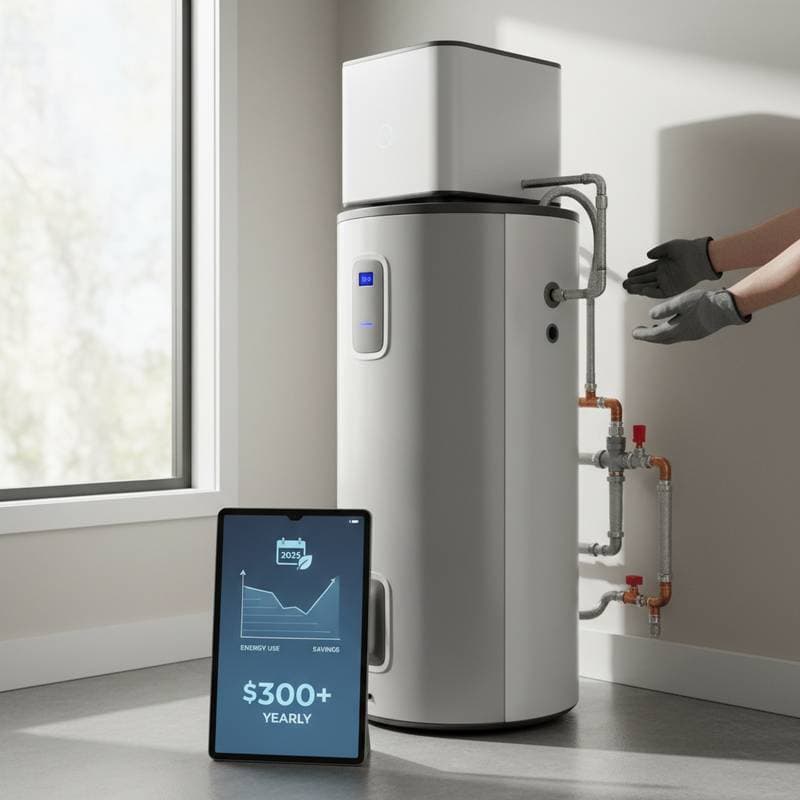How Much Can a Heat Pump Water Heater Save You in 2025?
Heat pump water heaters represent a wise choice for homeowners seeking enhanced comfort and reduced energy use. Installation costs typically fall between $2,000 and $4,500, influenced by unit size, efficiency ratings, and regional labor charges. While initial expenses exceed those of conventional electric or gas units, substantial energy savings over time position this option as a sound investment for 2025.
This guide details the advantages of heat pump water heaters, including average installation prices, energy efficiency gains, influencing cost elements, and essential questions for professionals.
Selecting the Right Tank Size and Costs
Heat pump water heaters vary in tank capacity to match different household needs. Proper sizing delivers adequate hot water supply while minimizing energy waste.
| Tank Size | Average Installed Cost | Ideal For |
|---|---|---|
| 40 gallons | $1,800 – $2,800 | Single occupant or small apartment |
| 50 gallons | $2,200 – $3,200 | Two to three people |
| 65 gallons | $2,500 – $3,800 | Family of three to four |
| 80 gallons | $3,200 – $4,500 | Larger family or high-demand household |
Opting for a larger tank raises upfront costs yet avoids frequent cycling, which preserves overall efficiency and extends unit life.
Key Advantages of Heat Pump Water Heaters in 2025
Heat pump water heaters excel by extracting heat from ambient air rather than producing it through direct heating elements. This method consumes significantly less electricity compared to standard units.
Additional benefits encompass:
- Reduced operating expenses through lower energy demands, resulting in decreased utility bills.
- Environmental advantages from minimized energy use and lower greenhouse gas emissions.
- Quiet performance and dependable operation, with consistent hot water delivery.
- Integrated smart features, such as Wi-Fi access for remote monitoring and control of energy usage.
With proper setup, these systems recover their cost in three to seven years via energy savings, depending on local rates and household patterns.
Heat Pump Water Heater Frequently Asked Questions
How Long Does a Heat Pump Water Heater Last?
These units generally endure 10 to 15 years with routine care and moderate use. Clean filters monthly and schedule annual professional checks to prolong service life and avoid breakdowns.
Are Heat Pump Water Heaters Noisy?
Contemporary designs prioritize low noise, producing sounds akin to a refrigerator at 45 to 55 decibels. Placement in basements or utility spaces ensures minimal disruption.
Can a Heat Pump Water Heater Function in Cold Climates?
These systems operate in cooler conditions, though efficiency dips below 50 degrees Fahrenheit. Hybrid models automatically engage backup electric heating to maintain performance during winter.
What Maintenance Does a Heat Pump Water Heater Require?
Routine tasks include air filter cleaning every one to three months, condensate drain checks, and yearly compressor inspections. These steps sustain peak efficiency and ward off costly repairs.
Do Heat Pump Water Heaters Cool the Surrounding Area?
The heat extraction process lowers nearby air temperature by a few degrees. In warmer regions or garages, this effect provides a subtle cooling benefit alongside hot water production.
Obtaining Quotes for Heat Pump Water Heater Installation
Expert installation guarantees optimal performance and longevity. Solicit estimates from at least three certified contractors to compare costs, warranties, and service quality.
Essential Questions for Contractors
- Which size and model of heat pump water heater suits my household demands?
- What rebates or incentives apply locally or federally to this upgrade?
- How many hours or days does installation require?
- What coverage do warranties provide for parts and labor?
- Will you manage the removal and eco-friendly disposal of the existing unit?
- Does my electrical setup support the new system without upgrades?
- What ongoing maintenance do you advise to ensure reliability?
- Are extra fees involved for plumbing modifications or ventilation?
- Based on my usage, what annual utility savings can I anticipate?
- Do you provide maintenance contracts or follow-up services?
Strategies to Maximize Energy Savings
To fully leverage a heat pump water heater, integrate it with broader home efficiency measures. Set the thermostat to 120 degrees Fahrenheit for balanced hot water availability and energy use. Insulate pipes and the tank to retain heat and reduce recovery time.
Pair the unit with low-flow fixtures to lessen demand without sacrificing comfort. Monitor usage via smart app features to identify peak times and adjust habits accordingly. These practices amplify savings beyond $300 yearly, while enhancing system durability and environmental impact.





